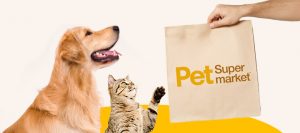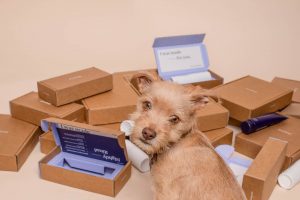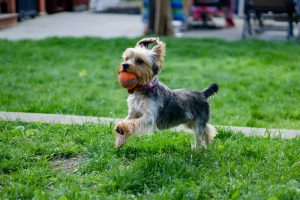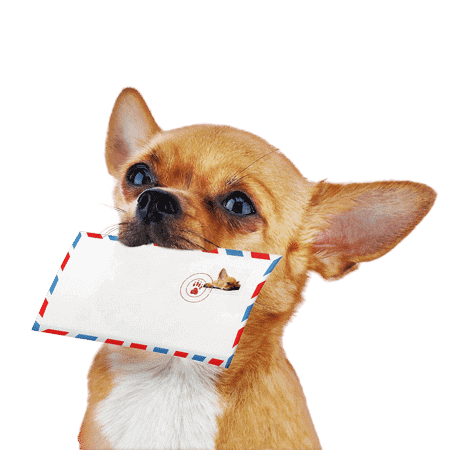The behavioural development of a puppy allows it to develop its skills to lead a social life adapted to its species. In dogs, it is conventionally described in 5 stages.
Before birth: the prenatal period
The prenatal period corresponds to the life in utero of the puppy. It lasts about 63 days.
The puppy begins to acquire sensory and emotional skills in his mother’s womb.
To obtain more tolerant puppies in contact and less reactive by extreme emotions, the breeder must caress and palpate the belly of the geared mother.
Between birth and the age of 2 weeks: the neonatal period
The puppy is deaf, blind and unable to move otherwise than the railing. His behaviour consists only of archaic reflexes to tete or find a heat source. He is totally dependent on his mother, who is breastfeeding and licking to stimulate the elimination of his excrement. The mother, meanwhile, starts attaching to her little ones during this period.
At this point, it is useful to manipulate the puppies every day gently to weigh them to activate the development and maturation of their brains, but very briefly so as to respect their sleep. It is indeed while the puppy sleeps, which he secretes his growth hormone and, at this time, the puppy sleeps a lot: up to 90% of his time! During the remaining 10%, he eats!
from 2 to 3 weeks: the transition period
At his two weeks, the eyes of the puppy open, and in his three weeks, he is able to hear. With its new sensory capabilities, the puppy is able to move. It is also at this time that the puppy attaches to his mother we speak of primary attachment.
The role of the breeder or the owner is then to continue to have regular interactions with the puppy and to verify that his new senses are functional.
Three weeks to 3 months: the period of socialization
The puppy sees, hears, is able to move without crawling; it plays, short and jumps. These new physical and sensory capacities lead it to explore its “star environment; that is, returning after each new discovery in the soothing and reassuring of his mother. It begins with a period of attraction during which the puppy, curious of everything, approaching all that is new without fear and is followed by a period of aversion, after the fifth week when he crosses a phase of neophobia (fear of novelty).
During this period, the puppy goes:
Learn that it belongs to the species “dog”. For that, he must rub shoulders with other dogs, his mother, his brothers and his sisters but ideally dogs that belong to other breeds that his in order to learn the behavioural codes specific to his species.
Learn what friendly species are. The young animal will learn to live in the presence of the human being but also animals of various species and to consider them as familiar. In order for this learning to be done, it is useful to put the puppy in contact with people of different types (men, women, children …) and with other animals, like cats. Otherwise, the puppy could develop apprehension (or even aggression or predation) vis-à-vis the types of individuals he never used to rub shoulders with. In fact, beyond the 12th week of the puppy, any new species encountered will be much longer and more difficult to integrate ” into the directory;” Known and familiar species.
She is learning to control his jaws and to control her physically and emotionally. During the fights between brothers and sisters, if a puppy bites too strongly one of the members of siblings, the mother comes the ” punish ” By immobilizing it a few seconds. When the puppy mortals too hard, she does not hesitate to reprimand him by repulsing him. The actions of the mother are on the basis of learning self-control and control of the puppy jaw. If this learning is defaulting in the puppy, we then risk ” manufacture ” An impulsive, brutal and clumsy adult dog or even aggressive … in a word that lacks self-control. The role of the breeder is, therefore, to verify that the mother fulfils her role. If this is not the case, it will have to make sure that another dog can fulfil this role in its place or substitute for this learning.
Store references from situations, living environments, environments. During its socialization period, the puppy recorded all he lives – the good like the bad experiences – in his brain that will then act as a “database” for all his future life. The more the puppy has experienced various situations, the more comfortable it will be in an environment rich in stimulations. The owner, whether special or breeder, must therefore make a maximum of situations to his puppies and confront them with varied environments in order to constitute the best of “databases” for their future life. Otherwise, the dog may develop apprehension for all situations or environments they have not known during this period.
Note well
Much of the dog’s behavioural development is happening before its two months, that is to say, before the legal age of sale or adoption in France. And, therefore, in the breeder. Therefore, we understand much better the importance of choosing a good breeder. The latter must initiate the socialization of the puppy by putting it in contact with animals and different people and submitting it to various stimuli.
3rd month at puberty: The juvenile period
The juvenile period extends from the 3rd month to the puberty of the dog, which intervenes more or less early according to breeds and dog templates.
During this period, the socialization of the puppy must be continued. This is the right time to start attending a puppy school to refine the acquisition of intraspecific communication rituals.





